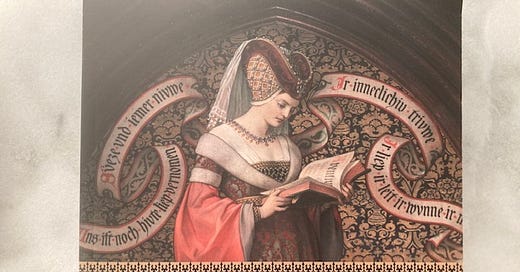Even though I have been homeschooling my children since 2016, it has only been in the last few years that I began to read seriously about educational philosophy. I started with For the Children's Sake by Susan Schaeffer Macaulay (this seems to be the book everyone starts with), but didn’t read much else on the subject until spring of 2022. I then moved on to In Vital Harmony by Karen Glass which I recommend highly, especially if you lean towards Charlotte Mason’s educational ideas.
I am currently reading the first book in Miss Mason’s six-volumes, Home Education, and in March of 2023 I started the 658-page behemoth, The Great Tradition by Richard Gamble. It’s an anthology of excerpts from writings on education starting with the Ancient Greeks and ending with 20th-century thinkers like Dorothy Sayers and C. S. Lewis. This topic interests me deeply for several reasons. Firstly, I have noticed that there is a lot of confusion/disagreement on what exactly is meant by a “Classical education.” Many people think of it as a set of practices (memorizing; learning Latin) and stages (Grammar, Dialectic, and Rhetoric), but I wanted to go directly to the sources and find out what Plato, Aristotle, etc. had to say about it.
Secondly, I want to discover how Charlotte Mason fits into the Classical Tradition, because I have a hunch that she very much does, despite what you may hear to the contrary.
So, here I am, six months later, and 77 pages in. I fully expect that I will spend a few years reading this, and I am excited to share what I discover. This passage by Richard Gamble from the introduction particularly moved me:
This invitation goes out to all teachers, parents and students who seek ways to defend liberal learning from the onslaught of careerism, utilitarianism, and numbing technique that threatens public and even private and Christian education, who seek to reconnect themselves with an ancient yet living tradition. The Great Tradition embraces an enduring community of learning that values liberal education for its own sake; desires to educate for wisdom and virtue, not power and vanity; finds tiresome the present age’s preoccupation with utility, speed, novelty, convenience, efficiency, and specialization; and refuses to justify education as a means to wealth, power, fame, or self-assertion. The Great Tradition patiently endures, ready to speak on its own behalf, ready to challenge narrow prejudices, ready to examine those with the courage to be interrogated by it, ready to teach those who are willing to be made unfit for the modern world.
-Richard Gamble, “The Great Tradition”
Do you enjoy reading about educational philosophy? If so, please share your favorite books below in the comments! I’m certain it is a topic I will happily continue learn about for the next few decades.





Shannon! I am so excited to read your thoughts! Thanks for sharing. Love you friend